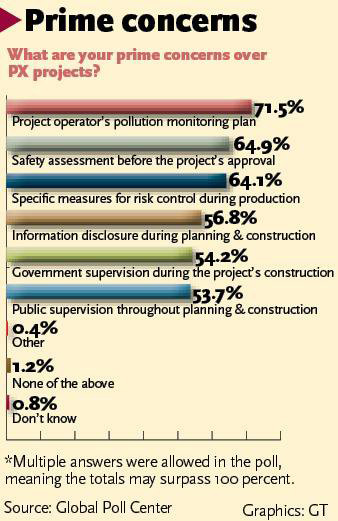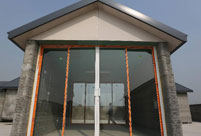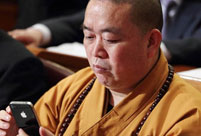 Let's dance in harmonic Shaanxi
Let's dance in harmonic Shaanxi
 Christie's to auction dazzling diamonds
Christie's to auction dazzling diamonds
 'Model husband' shatters image of love
'Model husband' shatters image of love
 Can animals smile? Or put on a happy face
Can animals smile? Or put on a happy face
 Geng Xuan crowned at 9th China Super Model Contest
Geng Xuan crowned at 9th China Super Model Contest
 Backstage at China Fashion Week
Backstage at China Fashion Week
 Ballerinas anywhere but onstage
Ballerinas anywhere but onstage
 Top 10 safest airlines in the world
Top 10 safest airlines in the world
 Posters of 33rd HK Film Awards unveiled
Posters of 33rd HK Film Awards unveiled
 Top 10 most popular instant messaging apps in the world
Top 10 most popular instant messaging apps in the world
 |
| (Graphics: GT) |

(Graphics: GT)
A Global Times poll has revealed that over one-third of respondents in five cities, where paraxylene (PX) projects were planned, oppose construction of PX plants, while only 20 percent supported them, with nearly 40 percent expressing neutrality.
The poll, conducted by the Global Times Global Poll Center from Saturday to Sunday through telephone interviews and online survey, collected responses from 1,060 residents in Xiamen, Dalian, Kunming, Chengdu and Maoming.
PX projects in the five cities have been suspended due to public outcry. In the most recent case in Maoming, Guangdong Province, thousands of protesters held rallies in front of the local government offices, which later developed into clashes with police, although no casualties were reported.
The poll found 36.8 percent of respondents opposed PX projects being developed in their cities. The main reason they oppose the project is the possible harm to health, and another major concern is environmental pollution.
PX, a byproduct of oil refining, is a major raw material for making polyester products. It can be controlled when sealed, but if exposed to the air, it becomes volatile. If the wind is blowing, this poisonous gas is hard to control, said Zhao Zhangyuan, a professor at the Chinese Research Academy of Environmental Sciences.
Some 70 percent of respondents cited the PX project operator's plan to control pollution as their prime concern, followed by safety evaluation and information disclosure.
The survey showed that over half of those polled said they have a certain amount of knowledge about PX projects, while about 28 percent said they don't know about them.
The main source of respondents' knowledge about PX projects is the Internet, followed by media reports and discussions among relatives and friends. In comparison, the poll found only one-third of them chose government as their information source.
Jia Weilie, a deputy director at the Beijing Academy of Ecocivilization, told the Global Times that these findings reflect the inadequate work done by government.
Since last year, the government and official media outlets have stepped up efforts to promote knowledge about PX projects in the wake of protests against them.
China Central Television recently aired a report in its flagship news program Xinwen Lianbo on an online battle launched by students from Tsinghua University about a description of PX in an online encyclopedia which said it is of "low toxicity."
Some 66 percent of respondents with a college education said their concerns were reduced to some extent after hearing explanations from media and experts. Nearly 30 percent of those with middle school diplomas said the explanations did not help.
The Global Poll found that senior respondents are more likely to support PX projects than younger respondents. Nearly 70 percent of respondents with a college or higher degree are likely to trust explanations by experts and media and reduce their concerns over PX, while only 28.6 percent of respondents with a middle school or lower diploma were convinced.
Li Zhiqing, a deputy director at the Center for Environmental Economics Studies of Fudan University in Shanghai, said that both the information sources and personal education background will affect the way people perceive the PX issue.
Some people will try to know about PX through different channels and gain a deeper understanding, so the media and experts should explain PX with simpler words and should not just draw a conclusion directly which categorizes the project as just good or bad, Li said.
Jia noted that the key problem, instead of discussing whether to have PX projects, lies in how to control the risk after construction. Some people, who have a rational understanding of PX, will also protest, as they worry about the enterprises. They believe enterprises will not use best practices and also that local governments may fail to supervise the plants adequately.
There is no platform to allow the three parties, namely government, enterprises and people to have dialogue. If we want to reach a balance between these interest groups and the environment, then China needs such a system, Jia said.
 3D-printed houses built in Shanghai
3D-printed houses built in Shanghai World largest scale of umbrella dance
World largest scale of umbrella dance Cherry blossoms reach peak bloom in Washington D.C.
Cherry blossoms reach peak bloom in Washington D.C. Red terraced fields in Dongchuan of Yunnan
Red terraced fields in Dongchuan of Yunnan Presentation ceremony of 33rd Hong Kong Film Awards
Presentation ceremony of 33rd Hong Kong Film Awards Cyber life of monks and nuns
Cyber life of monks and nuns Let's dance in harmonic Shaanxi
Let's dance in harmonic Shaanxi Jiaju Tibetan Village
Jiaju Tibetan Village Confucius institute at UC Davis
Confucius institute at UC Davis The backstage of the Fashion Week
The backstage of the Fashion Week College students in Han costumes
College students in Han costumes Postgraduate works as waitress
Postgraduate works as waitress Life in a Lahu village in Yunnan
Life in a Lahu village in Yunnan An orphan’s wedding
An orphan’s wedding Hollywood documentary brings Diaoyu Islands truth to new audience
Hollywood documentary brings Diaoyu Islands truth to new audienceDay|Week|Month